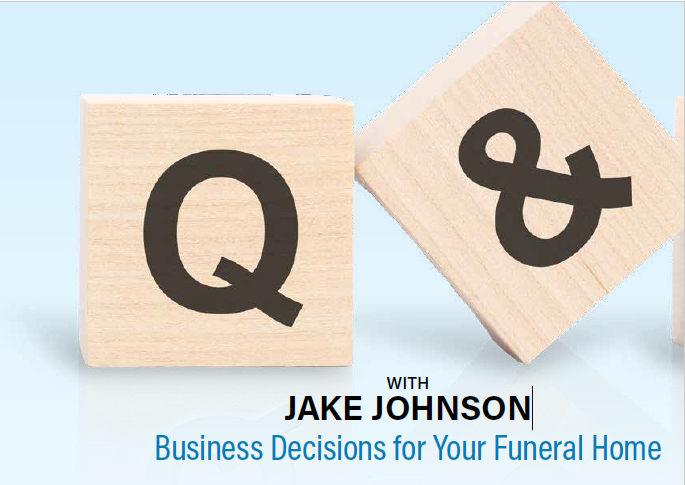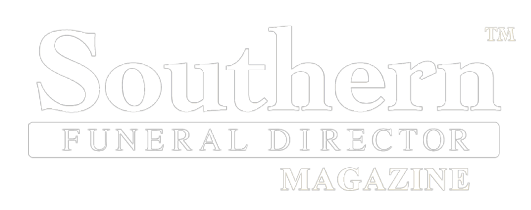(404) 312-6640
Business Decisions for Your Funeral Home
Independent firms are increasingly approached
by consolidators (big and small), what are the
top 3 considerations when contemplating the
sale of a generational, family owned firm?
A. Don’t go at it alone. Get an industry expert to
lead you through the process. It is money well
spent. If not, oftentimes hundreds of thousands of
dollars are left on the table.
B. Get your house in order before you start the process.
Not only the physical location but financially make sure your
books/financial statements are in good order.
C. Don’t wait too long. In some cases, sellers come to us
with declining case volume and revenues. Makes for a tough
sale. If you are thinking of selling, the best time to do so is
when the firm is doing well and with a bright future!
D. Have a clear understanding on how you, the owner and
your employees will be taken care of after the deal has been
consummated. It is imperative to have a full understanding of
what your retirement needs are and if the sale of your business
will provide enough principle and income to live comfortably.
E. An owner may also consider a sale/leaseback program
where they sell the business internally/externally and keep
the real estate which will provide a monthly income via a
lease payment. This will allow the owner to sell the real estate down the road and receive additional equity for investments
and retirement.
Why is it so important for a funeral business
or any business to keep impeccable, up to
date “Profit & Loss” statements? Does paying
the government more taxes on your tax return
guarantee a higher sales price if one decides to sell in the
next 5 years?
Our company constantly deals with sellers where
they have a very nice firm, but their financial records
were awful. Firms like this should be purchased, but
without knowing the financial aspects of the firm, it
is very difficult for a buyer to understand what he/she is purchasing
or what the true of the business is really worth. Also,
most privately or family owned businesses run a lot of personal
expenses through their business.
How effective or accountable are “Non
Competes” in any sale or change of business
ownership?
Always a matter of contention in a deal but usually
worked out. The fact of the matter is that in funeral
service, the goodwill of the owner is critical to the
success of the location. Without a non-compete,
very few transactions would take place. The non compete
payment is also used as part of financing the purchase price.
There needs to be a decent financial remuneration as part
of the noncompete and the scope should not be too large.
More recently, and in many states, non competes are “not”
enforceable unless the document is part of the financial
arrangement of the sale.
Are you seeing less and less of the next
generation taking over the family business?
And why has this shifted from 25-50 years ago
when it was a given that son or daughter would
be the successor to the family business?
This has been decreasing through time. I think
some of it has to do with the next generation seeing
the amount of work that the parents commit to
the funeral business. Sometimes getting up from the dinner table to make a first call, etc, is necessary for the
profession, but will wear on a family, especially if the owner
is constantly missing ball games, recitals or other activities
that children have growing up. This generation now, does not
want their children to experience the lack of presence that
they endured when they were growing up.
With interest rates on commercial loans
averaging around 7.5% and banks paying
bare minimums on CD’s and other secured
investment options, how can one get his equity
out and still live through retirement on the low interest
without going in to the principle?
Depends on the size of the transaction for one
thing. There are still some decent investments out
there, just not what they used to be. There are several
options a seller could consider.
1. Owner finance aportion of the deal in the form of a note
which could pay a higher interest rate than investment
rates. A little risk here, but not all that much if the buyer is
qualified and the note is well secured.
2. Sell the business and keep the real estate as we discussed
in one of the earlier questions. This gives the owner an
influx of cash on the sale of the business only. The real
estate can be kept and receive monthly lease payments,
then sell the real estate a couple of years later to receive
another round of cash.
3.If the owner has other real estate interest a 10-31 Exchange
is another option which would allow the seller to take his
equity and invest in another similar/qualified real estate
transaction which would defer the taxes on the original
sale until a later date.
Do you expect to see more sales of business or
internal changes of ownership in the next 10 years
compared to the previous 10 years, and why?
I think there will definitely be more sales of businesses.
It is not getting easier to make money in
funeral service. The cremation rate continues to
rise which lowers your average sale resulting in
lower annual revenue. It is known that 60-70 call businesses
are having more difficulties making a profit. By partnering up
or purchasing your competitor you have strength in numbers
and can share valuable employees and become more profitable
using economies of scale.
Other small consolidators seem to be
purchasing the businesses that are too small
for the publicly traded companies to acquire.
Are these clusters of 50-150 call firms a liability to the
small consolidator? For example, if cremation continues
to rise, then a 100-call location would theoretically have
less revenue yearly. How can less revenue increase
profitability and value?
On the contrary I like these type of deals.
Especially if there are significant synergies that
can take place as part of the transaction. We must
remember that there is one price that is paid for
these types of firms. However, when rolled up into a bigger
package, there is much more interest and the multiples
rise significantly.
It has been said that a funeral home is “more
valuable yesterday than today.” Do you feel that
a funeral home operation is less valuable each
passing year because of the rise in cremation
and the decline in revenue?
Depends on the individual funeral home. Some
more progressive funeral homes are taking advantage
of the market and actually growing in
revenues while at the same time streamlining their
operations. Those firms are not losing value. Unfortunately,
that is the minority. The majority of funeral homes are feeling
the rise in cremation as well as the decline in clients’ buying
habits as they opt for lesser service and caskets. These firms
are definitely losing value year to year and the trend is not
likely to stop. If the trend continues, and it will, it may be time
to make some hard decisions.
What is the realistic life span of a 70-call
funeral home over the next 10+ years, as the
cremation rate rises and the traditional service
falls? Is there enough profitability for a 70 call
firm to survive, or will they need to merge or sell to other
neighboring firms to have enough volume to survive?
As cremation continues to rise, it is the smaller funeral
homes that will feel the impact the most just
because they do not have the scale to adjust for
this trend. This is especially true as most owners do
not want to adjust their personal standard of living as profits
continue to decline. The natural next step would be for smaller
firms to merge to add some scale to their operation and keep
labor at a reasonable level. Hard for some to do so but it does
make sense.
Have the more prominent public companies
completely abandoned the “Main Street, USA”
businesses in favor of larger metropolitan
cities where community relationships are less
needed and higher prices are less notable than small
communities?
The larger consolidators certainly focus on the larger metropolitan
cities but they will also look at independent firms that are in a geography where they currently have
a presence. It appears that they are shying away
from Main Street from a glance but I think there is
still a market for many of these firms. However, they
should not expect the same value multiples as the larger more
metropolitan firms. As the years roll out, I believe the Main
Street firms will provide a better opportunity for the regional
consolidators to expand.
President & CEO at Johnson Consulting,
Jake began his career at Keystone
Group Holdings (now Dignity Memorial
Network) as Associate Director, Corporate
Development. This job included financial
analysis, bank and equity partner
presentations, along with accounting
and system setup with acquired funeral
homes. Jake then went on to work at Palm
Mortuaries and Cemeteries in Las Vegas,
NV which at the time handled 6,500 funeral home families and over
2,200 cemetery cases out of 6 locations. Here Jake conducted funeral
directing, funeral arranging, funeral home management, cemetery
operations management, and sat on the executive board. Jake’s
ability to problem solve business issues contributes to his success
in currently owning a funeral home and cremation center in Sun City,
Arizona along with a small-town funeral home in Batesville, IN. Jake’s
education includes a BSBA degree in Management with an emphasis
in Accounting and Financial Analysis from Xavier University. His
foundation in accounting and EBITDA forecasting is complemented
by technology savviness and management qualifications in business
development and operations. He is also a licensed REALTOR in Arizona
and a Register Investment Advisor Representative and is currently a
member of the Entrepreneur Organization (EO) Arizona Chapter. Jake
is also a member-emeritus of the Funeral Service Foundation Board.






Comments